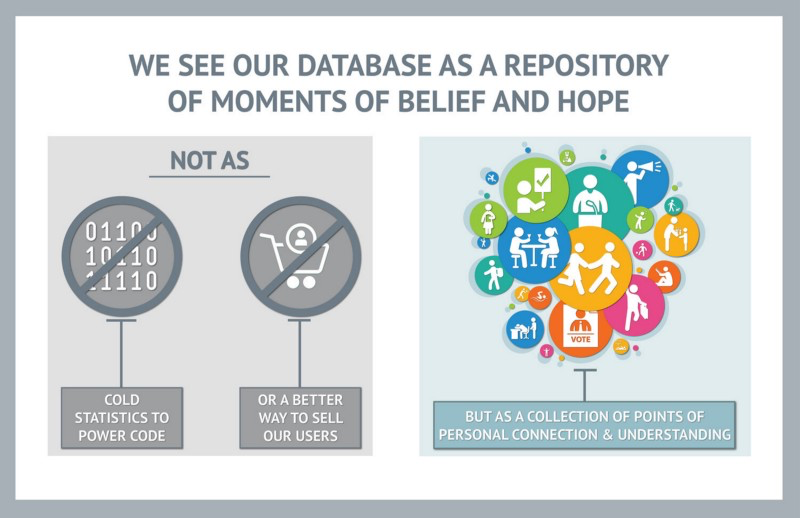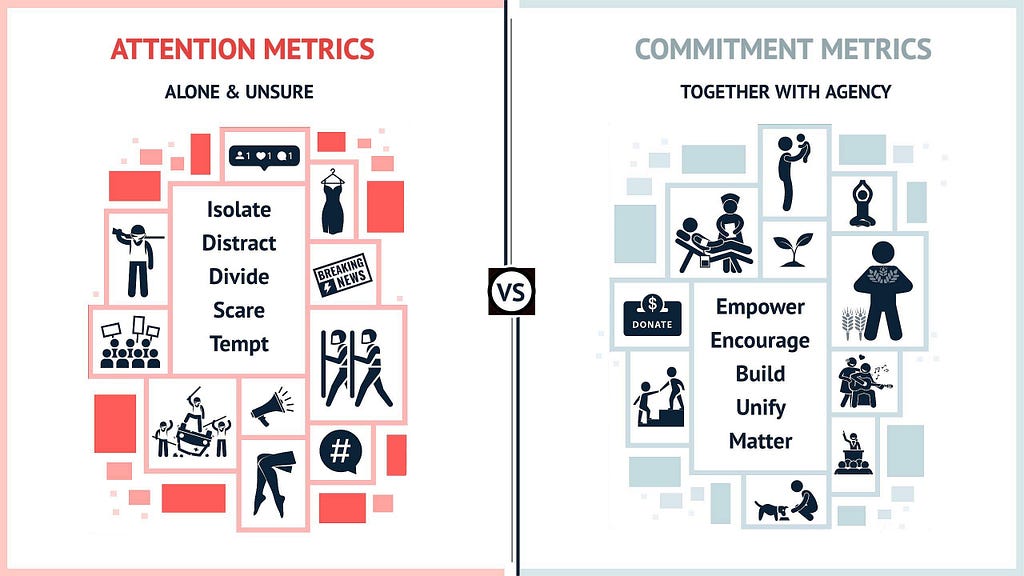B Corp Public Democracy Takes a Community-Building Approach to Data

By Rob Lalka
Most of the data that companies gather on us is being used to get our attention and sell us things. The more companies know about what we’ll look at and buy, the easier it is to accomplish those goals. They’ve found increasingly effective ways to predict such behavior by having AI learn from data profiles about our physical characteristics, income levels, purchasing patterns, and the like.
As a Certified B Corporation, Public Democracy has taken a different approach to what matters with data. Over the past decade, we’ve supported a wide array of civic, service, political, advocacy, and community-building initiatives. Our Values Data is a collection of millions of points of connection and meaning, representing the moments when someone committed to join a cause or took time to learn more about something that mattered to them. From sharing a hopeful documentary or an inspiring political ad to serving at a soup kitchen or signing a petition advocating for others, each moment is a reflection of dreams, empathy, and agency.
By compiling those moments, we have learned about more than what people will buy. We’ve gained a deeper understanding of what motivates individuals to seek the common good and what they care most about.
When data measures commitment over attention, reflects people’s beliefs over what they’ll react to, and prioritizes what matters over what sells, it provides a much better picture of who people are and what they really value.

Values Data is more effective at digital engagement efforts and targeted marketing, primarily because it encourages the advertiser to meet the user’s needs rather than the other way around. It also teaches different lessons about what people care about to the data-driven AI systems that control so much of what we all see and who we connect with.
Every single moment of commitment and contribution paints a much truer picture of who we all are; taken together, this data can teach algorithms to understand humanity in deeper and more meaningful ways, too.
As a B Corp, Public Democracy is on a mission to align what is right with what works. And today, as we bring to market one of the largest datasets ever designed to achieve B Corp principles, we wanted to share a few lessons about how Data For Good can make all data better.
Public Democracy is part of the community of Certified B Corporations. Learn more about this growing movement of people using business as a force for good, and sign up to receive the B the Change Weekly newsletter for more stories like this one, delivered straight to your inbox once a week.
Lesson 1: Origins matter when it comes to data.
When I was in college, Mark Zuckerberg was busily writing the first code for FaceMash, a precursor to thefacebook.com. He modeled his initial premise off HOTorNOT.com. The first version of Facebook (now a corporation with over half a trillion dollars in market cap) was designed to display photos from Harvard’s freshman class directory so users could choose who was more attractive. An early iteration of YouTube was also based off HOTorNOT.com; now the world watches YouTube over a billion hours a day.
The code that powers the tech giants that have created incredible value for consumers around the world — and especially for their early investors — got started with, well, hormone-fueled pseudo-pranks. It was designed to drive attention by feeding the impulses and insecurities of those judging others and those who kept checking to see how they were judged.
This is not a good thing, because origins matter when it comes to data. Back in the mid-2000s, most tech founders were asking, “What will people click on and what will keep them coming back?”
That remains their focus today.

Eric Sapp, the president of Public Democracy, intentionally took a different approach. He built Public Democracy’s data, from the very first byte, to discover, “What do people care about and what will they do together?” Trained as a pastor, Sapp knew that people are best understood by their values and best engaged through empathy and listening.
Inspiring someone to act—as Sapp and his team did on behalf of Oxfam, Bread for the World, and other impactful organizations—starts with understanding how to provide them with something they value. That creates better results, and it yields a different kind of data. Taken together, this data can teach algorithms to know us all in deeper and more meaningful ways, too. When AI systems learn from those moments, Values Data depicts people as more than purchasers, understanding them as more complete (and complex) individuals, not just consumers.
Lesson 2: Better data will train more meaningful algorithms.
Early Facebook investor Sean Parker said that what originally motivated Facebook was finding ways to “consume as much of your time and conscious attention as possible.” When Facebook released the like button and other similar features, Parker said the goal was “to give you a dopamine hit.” He explained, “that’s going to get you to contribute more content … [It’s] exactly the kind of thing that a hacker like myself would come up with.”
Netflix’s CEO once told investors that he does not consider Hulu or Amazon Prime as their greatest competitors. Instead, he said the real rival is anything else people do other than Netflix to “unwind, hang out, connect.” He went on to brag that “we actually compete with sleep. And we’re winning!”
Sleep is so cute when it tries to compete with Netflix.
For Public Democracy, each data point represents more than an attention-getter. Every engagement in our database reflects a moment when a person decided that something we were offering them could make a difference and that their participation mattered. As their data built toward a picture of what they would commit to, we increasingly recognized the inherent value in each of those moments — as a repository of intent, hope, and communal engagement by tens of millions of individuals over many years.
Unlike most other data at work in the marketplace today, Public Democracy’s Values Data will teach AI what people commit to when engaging with more compassionate “parents,” such as Oxfam and Bread. Data focused on commitment, values, service, and community tells a more holistic story of what people care about, improving the data-driven AI systems that control so much of what we all see and whom we connect with. We’ve already used Values Data to train award-winning AI-driven behavioral models to help veterans with severe PTSD, develop groundbreaking ways to identify and engage those struggling with addiction, and improve market intelligence about the needs and priorities of underserved communities.
We think the time is right to bring this data to market, because using technology to connect with people who believe their actions can matter is needed now more than ever.
Lesson 3: Better data and more meaningful algorithms will be more purposeful and profitable.
As a captivating David (Carroll) versus Goliath story, The Great Hack is an entertaining, albeit terrifying, docudrama about Cambridge Analytica’s sinister approach to data. The truth is, Facebook wasn’t hacked — America was. Cambridge collected as much data as it could, to profit as much as it could off people’s data without their knowledge. Its strategy was, in so many ways, the opposite of Public Democracy’s approach to business and the impact we create.
Data does have immense potential to give people agency and connect them in more meaningful ways. As I’ve heard Sapp say to the Public Democracy team many times:
“Data is a tool, and any tool can be used to help or hurt. But some tools are better suited for one use over another. A rifle and a hoe can both be used to kill someone or to dig a furrow for planting crops. But each is better at — and more likely to be used for — one use than the other.”
That is why over the past several years, Public Democracy’s Values Data has powered award-winning civic engagement around bipartisan policy solutions and trained groundbreaking AI solutions. Those efforts are now attracting some of the biggest corporate players in data, as well as government agencies tasked with tackling our most pressing social challenges, to create new partnerships that will depend on the unique understanding that Public Democracy’s AI systems generate. We are confident that, together, we can chart a better course — and we hope we’ll have some tailwinds to propel us.
Stewarding Data in the Silicon Age
Last month, 181 CEOs signed a letter that probably made Milton Friedman roll over in his grave. Going against the tenet that the sole purpose of business is to maximize shareholder profit, they supported the Business Roundtable “modernizing its principles on the role of a corporation,” so that business practices should benefit multiple stakeholders, including employees, customers, local communities, shareholders, and the environment.
This position echoed a similar letter last year from the CEO of BlackRock, the world’s largest asset manager. Larry Fink wrote:
“Without a sense of purpose, no company, either public or private, can achieve its full potential. It will ultimately lose the license to operate from key stakeholders.”
That message resonated loudly, to the tune of $6 trillion under management.
But while the tectonic plates are now moving beneath us, let’s be clear that those shifts are only possible due to hundreds of tremors caused by the B Corps that have advanced “business as a force for good” since 2006. That’s what Public Democracy stands for.
Our data doesn’t just make us different (which even Cambridge Analytica claimed). At Public Democracy, our data makes a difference. That’s what our company is built to do. As a B Corp, we have a fiduciary responsibility toward all of our stakeholders and greater accountability internally and externally for our actions.
Our profits feed our purpose; our purpose feeds our profits; and the flywheel turns.
Imagine if all early algorithms had been built from Data For Good, with more meaningful knowledge about all of us, rather than being designed to exploit our insecurities and impulses. Perhaps in such an environment, even a profit-at-all-costs company like Cambridge would have been directed down a different path. We’ll never know what might have been, but now we can choose what will be.
We hope other tech companies will join us by finding new ways — through better data, and the more meaningful AI it creates — to empower individuals, improve communities, and advance the common good. They will be right, and smart, to do so. If the Gilded Age has become the Silicon Age, and Standard Oil has been succeeded by Big Data, then it’s our duty as stewards of that data to do right by people as well as earn a profit.
We think that’s just better business, in both senses of the word.
Rob Lalka is chairman of the board of Public Democracy Inc. and Albert R. Lepage Professor in Business at Tulane University’s A.B. Freeman School of Business, where he serves as Executive Director of the Albert Lepage Center for Entrepreneurship and Innovation. This article coincides with today’s announcement by Public Democracy and LiveRamp, the nation’s leading data marketplace, that Public Democracy became LiveRamp’s first B Corp partner when it brought its proprietary Values Data to market.
B the Change gathers and shares the voices from within the movement of people using business as a force for good and the community of Certified B Corporations. The opinions expressed do not necessarily reflect those of the nonprofit B Lab.

Three Ways ‘Data for Good’ Can Make All Data Better was originally published in B the Change on Medium, where people are continuing the conversation by highlighting and responding to this story.